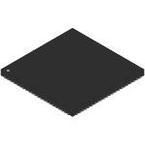●Product Details
●The ADAU1463/ADAU1467 are automotive qualified audio processors that far exceed the digital signal processing capabilities of earlier SigmaDSP® devices. They are codecompatible with each other, as well as the ADAU1450/ADAU1451/ADAU1452 SigmaDSP® processors. The restructured hardware architecture is optimized for efficient audio processing. The audio processing algorithms support a seamless combination of stream processing (sample-by-sample), multi-rate processing, and block processing paradigms. The graphical programming tool, SigmaStudio™ enables the creation of signal processing flows that are interactive, intuitive and powerful. The enhanced digital signal processor (DSP) core architecture enables some types of audio processing algorithms to be executed using significantly fewer instructions than were required on previous SigmaDSP generations, leading to vastly improved code efficiency
●The 1.2 V, 32-bit DSP core can run at frequencies of up to 294.912 MHz and execute up to 6144 instructions per sample at the standard sample rate of 48 kHz. Powerful clock generator hardware, including a flexible PLL with multiple fractional integer outputs supports all industry standard audio sample rates, non-standard rates over a wide range can generate up to 15 sample rates simultaneously. These clock generators, along with the on board asynchronous sample rate converters (ASRCs) and a flexible hardware audio routing matrix, make the ADAU1463/ADAU1467 ideal audio hubs that greatly simplify the design of complex multirate audio systems.
●The ADAU1463/ADAU1467 have four input serial ports and four output serial ports. Each has a fully asynchronous clock domain capable of operating as either clock master or slave. In addition, each serial port supports multiple data lines. Each of the eight pins SDATAIO pin may be associated with any of the four input or four output serial ports. Serial ports with multiple data pins use a single bit clock and frame clock to transmit or receive additional channels of audio data. This allows more channels of audio I/O without the need to run serial ports at high speeds. It also enables serial audio communication with multiple synchronous peripherals. The additional data pins can carry from two to eight channels. These expanded serial audio ports, along with the clock generators, the on board asynchronous sample rate converters (ASRCs) and a flexible hardware audio routing matrix, make the ADAU1463/ADAU1467 ideal audio hubs that greatly simplify the design of complex multirate audio systems.
●The ADAU1463/ADAU1467 interface with a wide range of ADCs, DACs, digital audio devices, amplifiers, and control circuitry with highly configurable serial ports, I2C, SPI, S/PDIF interfaces, and multipurpose input/output pins. Dedicated decimation filters can decode the PDM output of up to four MEMS microphones.
●The ADAU1463/ADAU1467 have independent I2C/SPI slave and master control ports. This allows them both to be programmed and controlled by an external master device such as a microcontroller, and program and control slave peripherals directly. Self-boot functionality and the master control port enable complex standalone systems.
●Applications
● Automotive audio processing
● Head units
● Navigation systems
● Rear seat entertainment systems
● DSP amplifiers (sound system amplifiers)
● Commercial and professional audio processing
●### Features and Benefits
● Qualified for automotive applications
● High performance SigmaDSP core enables low latency and audio applications
● Active Noise Cancellation (ANC)
● Echo-Canceller and Noise Reduction (ECNR)
● Surround sound algorithms
● Increased I/O and/or larger internal memory compared to ADAU1462/ADAU1463/ADAU1466 models
● Features SigmaStudio, a proprietary graphical Integrated Development Environment (IDE), for the development of custom signal flows
● Comprehensive Toolbox of pre-defined building blocks
● Faster design time with proven solutions
● Intuitive system design
● 294.912 MHz, 32-bit SigmaDSP core at 1.2 V
● 24 kWords of program memory
● 80 kWords of parameter/data RAM
● 6144 SIMD instructions per sample at 48 kHz
● 1600 ms digital audio delay pool at 48 kHz
● Audio I/O and routing
● 4 serial input ports, 4 serial output ports with assignable parallel data pins (up to 32 serial data pins total)
● 48-channel, 32-bit digital I/O up to a sample rate of 192 kHz
● Flexible configuration of I2S, left and right justified, and up to 16-channel TDM formats on serial data pins
● 8 stereo ASRCs from 1:8 up to 7.75:1 ratio and 139 dB dynamic range
● Stereo S/PDIF input and output at 192 kHz
● Four PDM microphone input channels
● Multichannel, byte addressable TDM serial ports
● Clock oscillator for generating master clock from crystal
● Integer PLL and flexible clock generators
● Integrated die temperature sensor
● I2C and SPI control interfaces (both slave and master)
● Standalone operation
● Self-boot from serial EEPROM
● 8-channel, 10-bit SAR auxiliary control ADC
● 26 multipurpose pins for digital controls and outputs
● On-chip regulator for generating 1.2 V from 1.8 V to 3.3 V supply
● 88-lead, 12 mm × 12 mm LFCSP package with 6 mm exposed pad
● Temperature range: −40°C to +105°C

 Part 3D Model
Part 3D Model
